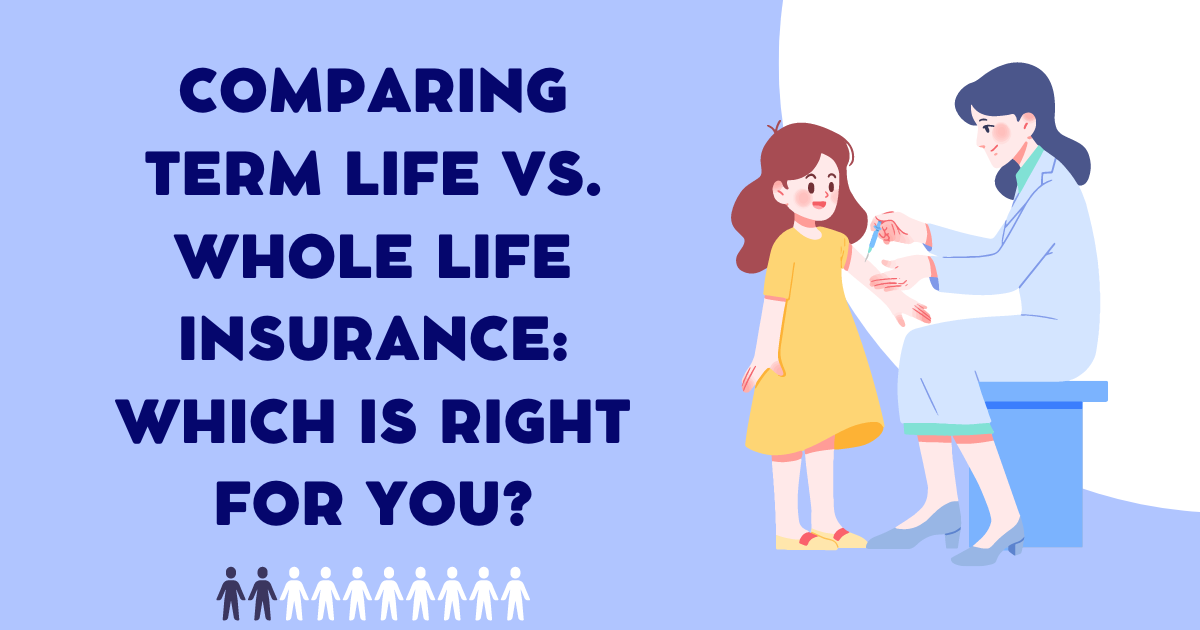Comparing Term Life vs. Whole Life Insurance: Which Is Right for You?
Introduction:
Choosing between term life and whole life insurance is a significant decision that can have long-term implications for your financial security and that of your loved ones. Each type of insurance offers unique features and benefits, catering to different financial goals and priorities. In this guide, we’ll compare term life and whole life insurance, exploring their key differences, advantages, and considerations to help you determine which option aligns best with your needs and circumstances.
Understanding Term Life Insurance:
Definition: Term life insurance provides coverage for a specific period, typically 10, 20, or 30 years, offering a death benefit to beneficiaries if the insured passes away during the term.
Features:
Affordable Premiums: Term life insurance often has lower initial premiums compared to whole life insurance, making it more accessible for individuals on a budget.
Temporary Coverage: Term policies offer coverage for a predetermined period, providing financial protection during key life stages, such as raising children or paying off a mortgage.
Considerations:
No Cash Value: Unlike whole life insurance, term policies do not accumulate cash value or offer investment features, focusing solely on providing death benefit protection.
Exploring Whole Life Insurance:
Definition: Whole life insurance is a permanent life insurance policy that offers coverage for the insured’s entire lifetime, providing a death benefit and cash value accumulation.
Features:
Lifetime Coverage: Whole life policies guarantee coverage for the duration of the insured’s life, providing peace of mind and long-term financial protection.
Cash Value Growth: Whole life insurance builds cash value over time, which can be accessed through policy loans or withdrawals for various purposes, such as supplementing retirement income or covering expenses.
Considerations:
Higher Premiums: Whole life insurance typically requires higher premiums compared to term life insurance due to its lifetime coverage and cash value component.
Complexities: Whole life policies may involve more complexity, including investment components, dividends, and policy riders, requiring careful consideration and understanding.
Factors to Consider When Choosing:
Financial Goals: Determine your long-term financial objectives, such as income replacement, wealth accumulation, estate planning, or legacy building.
Budget and Affordability: Evaluate your budget and ability to pay premiums over time, considering both immediate and future financial commitments.
Investment Preferences: Assess your risk tolerance, investment knowledge, and preference for guaranteed returns versus potential market growth.
Estate Planning Needs: Consider whether you have estate planning concerns, such as providing liquidity for estate taxes or leaving a legacy for future generations.
Combination Strategies:
Hybrid Approaches: Some individuals opt for a combination of term and whole life insurance to balance cost-effectiveness with long-term coverage and investment growth.
Layered Protection: Layering term and whole life policies can provide flexibility, allowing you to adjust coverage levels based on changing needs and financial circumstances.
Consultation and Review:
Professional Guidance: Seek advice from a licensed insurance agent or financial advisor who can assess your individual situation, provide personalized recommendations, and help you navigate the complexities of life insurance.
Policy Review: Regularly review your insurance needs and policy options to ensure they continue to align with your financial goals, lifestyle changes, and family dynamics.
Conclusion:
Choosing between term life and whole life insurance requires careful consideration of your financial goals, budget, and risk tolerance. While term life insurance offers affordable coverage for a specific period, whole life insurance provides lifetime protection and cash value accumulation. By understanding the differences, advantages, and considerations of each type of insurance, you can make an informed decision that meets your current and future insurance needs, providing peace of mind for you and your loved ones.









